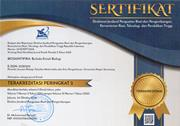Characteristics of superior soybean breeding lines tolerance to rust (Phakopsora pachyrhizi Syd.)
(1) Indonesian Legumes and Tuber Crops Research Institute (ILETRI),Jalan Raya Kendalpayak KM 8, PO BOX 66, Malang East Java, Indonesia, Phone :+62341 801468, Fax: +62341 801496,
(2) Indonesian Legumes and Tuber Crops Research Institute (ILETRI),Jalan Raya Kendalpayak KM 8, PO BOX 66, Malang East Java, Indonesia, Phone :+62341 801468, Fax: +62341 801496,
Abstract
Soybean rust caused by Phakopsora pachyrhizi is one of the most important diseases which limits soybean production. The aim of this study was to evaluate the resistance of 28 superior soybean lines and their tolerance to rust. The study was conducted at a screen house and arranged in a completely randomized design (CRD); three replications. All genotypes tested were artificially inoculated with P. pachyrhizi, and a set of un-inoculated genotypes was planted as a comparison. Number of pustules was recorded weekly, and resistant criteria was rated based on the International working group on soybean rust IWGSR method. Lesion color (LC), sporulation level (SL), number of uredia (NoU), frequency of pustule which had uredia, and yield were also recorded. Among 28 genotypes tested, only one was categorized as resistant and 2 genotypes were susceptible. Resistant genotypes had few pustules, lower AUDPC values, low disease severity, and Reddish Brown lesion type. Soybean rust affected yield components, i.e. number of intact pods and yield per plant. Yield loses due to rust in this study varied from 5-89%, and the average was 51%. The set of lines from Tanggamus pedigree showed more resistant to rust but less tolerant compared to Sinabung pedigree.
How to Cite
Inayati, A., & Yusnawan, E. (2016). Characteristics of superior soybean breeding lines tolerancet to rust (Phakopsora pachyrhizi Syd.). Biosaintifika: Journal of Biology & Biology Education, 8(1), 47-55.
Keywords
Full Text:
PDFReferences
Araujo, M. M. De, & Vello, N. A. (2010). Characterization of soybean genotypes for Asian soybean rust reaction. Crop Breeding and Applied Biotechnology (Online), 10(3), 197–203. http://doi.org/10.1590/S1984-70332010000300003
Cherif, M., Rezgui, S., Devaux, P., & Harrabi, M. (2010). Genotype × environment interactions and heritability of quantitative resistance to net blotch in Tunisian barley. Journal of Plant Breeding and Crop Science, 2(5), 110–116.
Godoy, C. V., Koga, L. J., & Canteri, M. G. (2006). Diagrammatic scale for assessment of soybean rust severity. Fitopatologia Brasileira, 31(43), 63–68. http://doi.org/10.1590/S0100-41582006000100011
Hartman, G. L., Hill, C. B., Twizeyimana, M., Miles, M. R., & Bandyopadhyay, R. (2011). Interaction of soybean and Phakopsora pachyrhizi , the cause of soybean rust. CAB Reviews: Perspective in Agriculture, Veterinary Science, Nutrition and Natural Resources, 6(025), 13. http://doi.org/10.1079/PAVSNNR20116025
Jarvie, J. A (2009). A review of soybean rust from a South African perspective. South African Journal of Science, 105(3/4), 103. http://doi.org/10.4102/sajs.v105i3/4.55
Kato M, Yorinori J T. 2008. A study on a race composition of Phakopsora pachyrhizi in Brazil: a difficulty of race identification. In JIRCAS Working Report No. 58, eds. Kudo, H. et al. JIRCAS, Tsukuba, Japan, 94-98.
Kawuki, R. S., Adipala E., Tukamuhabwa P. 2003. Yield Loss Associated with Soya Bean Rust (Phakopsora pachyrhizi Syd.) in Uganda. Journal of Phytopathology, 151(1):7-12. DOI: 10.1046/j.1439-0434.2003.00668.x
Kumudini, S., Godoy, C. V., Board, J. E., Omielan, J., & Tollenaar, M. (2008). Mechanisms involved in soybean rust-induced yield reduction. Crop Science, 48(6), 2334–2342. http://doi.org/10.2135/cropsci2008.01.0009
Li, X., Dias, a P., Xue, L., Pan, Z., & Yang, X. B. (2010). Uniqueness of the SBR pathosystem and its scientific value, global distribution , economic importance, and epidemiology of SBR. Plant Disease, 94(7), 796–806. http://doi.org/10.1094/PDIS-94-7-0796
Maphosa, M., Talwana, H., & Tukamuhabwa, P. (2013). Assessment of Comparative Virulence and Resistance in Soybean Using Field Isolates of Soybean Rust. Journal of Agricultural Science, 5(5), 249–257. http://doi.org/10.5539/jas.v5n5p249
Medeiros, E., Ponte, D., & Esker, P. D. (2008). Meteorological Factors and Asian Soybean Rust Epidemics - A System approach and implications for risk Assessment. Sci. Agric, 65(December), 88–97.
Mueller, T. a., Miles, M. R., Morel, W., Marois, J. J., Wright, D. L., Kemerait, R. C., Hartman, G. L. (2009). Effect of Fungicide and Timing of Application on Soybean Rust Severity and Yield. Plant Disease, 93(3), 243–248. http://doi.org/10.1094/PDIS-93-3-0243
Pham, T. A., Hill, C. B., Miles, M. R., Nguyen, B. T., Vu, T. T., Vuong, T. D., Hartman, G. L. (2010). Field Crops Research Evaluation of soybean for resistance to soybean rust in Vietnam. Field Crops Research, 117(1), 131–138. http://doi.org/10.1016/j.fcr.2010.02.011
Politowski, K., & Browning, J. (1978). Tolerance and resistance to plant disease: an epidemiological study. Phytopathology, 68(8), 1177–1185. Retrieved from http://www.cabdirect.org/abstracts/19791676201.html
Scafer, J. S. (1971). Tolerance to Plant Disease. Annual Review of Phytopathology, 9, 235–252.
Simko, I., & Piepho, H. (2012). The Area Under the Disease Progress Stairs : Calculation , Advantage , and Application. Phytopathology, 102(4), 381–389.
Slaminko, T. L., Sciences, C., Miles, M. R., States, U., Frederick, R. D., Bonde, M. R., Hartman, G. L. (2008). New Legume Hosts of Phakopsora pachyrhizi Based on Greenhouse Evaluations. Plant Disease, 92(5), 767–771.
Twizeyimana, M., Ojiambo, P. S., Sonder, K., Ikotun, T., Hartman, G. L., & Bandyopadhyay, R. (2009). Pathogenic variation of Phakopsora pachyrhizi infecting soybean in Nigeria. Phytopathology, 99(4), 353–361. http://doi.org/10.1094/PHYTO-99-4-0353
Yamanaka, N., Yamaoka, Y., Kato, M., Lemos, N. G., Passianotto, A. L. D. L., Santos, J. V. M. Dos, Suenaga, K. (2010). Development of classification criteria for resistance to soybean rust and differences in virulence among Japanese and Brazilian rust populations. Tropical Plant Pathology, 35(June), 153–162. http://doi.org/10.1590/S1982-56762010000300003
Refbacks
- There are currently no refbacks.

This work is licensed under a Creative Commons Attribution 4.0 International License.


